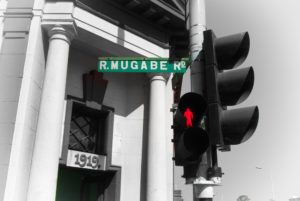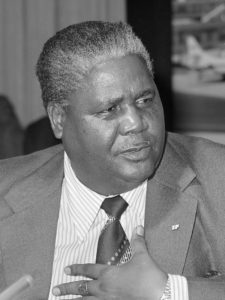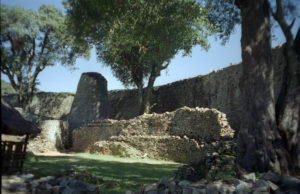by Sue Onslow, ICWS Deputy Director
 Zimbabwe has long been particularly important to the moral purpose of the Commonwealth. Indeed, in the 1970s, Commonwealth support enabled Joshua Nkomo to meet world leaders in closed session at the Commonwealth heads of government meeting in Kingston, in April 1975. This was a remarkable break through for Zimbabwe’s national liberation leaders. The following year, Chief Emeka Anyaoku, then Assistant Secretary General, and a small team of Commonwealth Secretariat staff spent three months in Geneva, throughout the abortive multi-party talks which followed Henry Kissinger’s bid to break the deadlock over accelerated political change in Rhodesia. (The Secretariat team also passed on regular subsistence payments to nationalist delegations, although the source of these funds is not clear.) Again, in 1979, first at the Lusaka heads’ meeting, then Ramphal’s ‘outer diplomacy’ combined with regular meetings of Commonwealth high commissioners and the Patriotic Front leaders at Marlborough House, all contributed the ultimate success of the protracted Lancaster House discussions. This was followed by other Commonwealth interventions – the presence of Commonwealth troops to monitor the precarious ceasefire, and at the initiative of the then-Secretary General ‘Sonny’ Ramphal, a Commonwealth election observation mission was rapidly assembled and sent to Rhodesia/Zimbabwe in February – March 1980. All were acutely aware of the importance of international credibility of the election result, as well as the reality of violence and intimidation, potential dangers and flashpoints over the course of the campaign. (It was not without its farcical elements – according to Derek Ingram, the group’s designated media expert, on the first day of the poll a rumour circulated that Coca Cola could remove indelible ink from the fingers of those who had voted, enabling them to ‘vote early and vote often’. Ingram was hurriedly dispatched to buy several bottles, as then back office officials earnestly tested the potentially devastating hypothesis)
Zimbabwe has long been particularly important to the moral purpose of the Commonwealth. Indeed, in the 1970s, Commonwealth support enabled Joshua Nkomo to meet world leaders in closed session at the Commonwealth heads of government meeting in Kingston, in April 1975. This was a remarkable break through for Zimbabwe’s national liberation leaders. The following year, Chief Emeka Anyaoku, then Assistant Secretary General, and a small team of Commonwealth Secretariat staff spent three months in Geneva, throughout the abortive multi-party talks which followed Henry Kissinger’s bid to break the deadlock over accelerated political change in Rhodesia. (The Secretariat team also passed on regular subsistence payments to nationalist delegations, although the source of these funds is not clear.) Again, in 1979, first at the Lusaka heads’ meeting, then Ramphal’s ‘outer diplomacy’ combined with regular meetings of Commonwealth high commissioners and the Patriotic Front leaders at Marlborough House, all contributed the ultimate success of the protracted Lancaster House discussions. This was followed by other Commonwealth interventions – the presence of Commonwealth troops to monitor the precarious ceasefire, and at the initiative of the then-Secretary General ‘Sonny’ Ramphal, a Commonwealth election observation mission was rapidly assembled and sent to Rhodesia/Zimbabwe in February – March 1980. All were acutely aware of the importance of international credibility of the election result, as well as the reality of violence and intimidation, potential dangers and flashpoints over the course of the campaign. (It was not without its farcical elements – according to Derek Ingram, the group’s designated media expert, on the first day of the poll a rumour circulated that Coca Cola could remove indelible ink from the fingers of those who had voted, enabling them to ‘vote early and vote often’. Ingram was hurriedly dispatched to buy several bottles, as then back office officials earnestly tested the potentially devastating hypothesis)

Commonwealth support enabled Joshua Nkomo to meet world leaders in 1975 at the Commonwealth Heads of Government meeting in Kingston
It was another Commonwealth election observation report, sternly criticizing the 2002 election campaign with its succinct summary of widespread instances of violence and intimidation as well as the range of vote rigging measures, which triggered the accelerating confrontation between President Robert Mugabe and the international organization. The memory of failure of the diplomatic efforts of the ‘troika’ of Commonwealth heads Thabo Mbeki/Olusegun Obasango/John Howard, despite last minute personal lobbying by ‘PJ’ Patterson, and Robert Mugabe’s defiant departure from the Commonwealth in December 2003, is still etched sharply on the minds of many long-term Commonwealth watchers.
Understandably, then, the accelerating ‘diplomatic dance’ of Zimbabwe’s reengagement with the Commonwealth, following the ‘non-coup’ of last November, has been managed with considerable caution. The emphasis has rightly been on respect for established procedures and due process under the 2007 Patterson ‘rules’. This is notwithstanding the remarkably public stance in support of President Emmerson Mnangagwa from Catriona Laing, the British Ambassador, seemingly enthusiastically backed by the former Foreign Secretary, Boris Johnson. Laing arrived in Harare in September 2014 with riding instructions to improve the lamentable state of British-Zimbabwean relations. However, in the view of many opposition spokespersons in Harare, she greatly exceeded her brief; indeed, the Ambassador has been publicly accused of actively ‘meddling’ in Zimbabwean politics, and in adopting a highly partisan public stance (such as wearing ‘That Scarf’, in Zimbabwe flag colours, on the steps of No. 10 Downing Street). Laing has made no secret of her preference for the ‘ZANU-PF stability’ narrative, to confront Zimbabwe’s profound structural economic problems – caused in overwhelming part by ZANU-PF’s own policies and licensed corruption.
The Commonwealth Secretariat and other leading Commonwealth countries have adopted a more cautious approach. There was a keen awareness that the lack of high-level Commonwealth organizational links put the Secretariat’s advance administrative support team for the current election observation group at a distinct disadvantage when they arrived in country in June. Indeed, it very rapidly became clear that any idea of using the 2002 election observation group’s report as a starting point was woefully out of date. Thus officials were on a very steep learning curve and very fortunate that the Commonwealth Local Government Forum has maintained an office in Harare, staffed by Zimbabweans, since 2003. The reality confronting the Commonwealth election observers who arrived in country on 23 July has been complex, and the insidious pressures of past intimidation palpable. Although political activists and commentators have all remarked on the remarkable political space which has opened up across the country since last November – to the extent that opposition parties have been able to campaign in previous ZANU-PF heartland constituencies in the rural areas of Mashonaland, Midlands and Masvingo – and there are hopes that the considerable number of domestic NGO and international observers will help keep the campaign ‘clean’ – other structural limitations persist. ZBC remains a state broadcasting rather than a public service broadcasting body, ensuring ZANU-PF has dominated TV coverage. Furthermore, as a recent Afrobarometer poll pointed out, most rural voters received their information on the election and party manifestos via government-sponsored local radio, and (government paid) local traditional leaders. Election observers are sifting through reports of disinformation and partisan official reporting on social media, and having to evaluate the performance and supposed impartiality of the Zimbabwe Election Commission, and its controversial chair, Justice Priscilla Chigumba. Public debates in the campaign have raged around ZEC’s management of the voters’ role and its publication, with accusations of anomalies and ‘ghost voters’; the printing and distribution of ballot papers, as well as their controversial design, which transgresses ZEC’s own rules.

Opposition parties have been able to campaign in previous ZANU-PF heartland constituencies in the rural areas of Mashonaland. Midlands and Masvingo
The Commonwealth prides itself on the professionalism and speed of publication of official reports following election observation missions. A common misperception about COGs is that they will deliver ‘the correct result’; instead, their remit is to evaluate the electoral process and assess the extent to which the running of any election campaign conforms to both established rules and Commonwealth good practice. It can do nothing about the dispatch of thousands of ZANU-PF commissars to the rural areas last November; merely comment on a demonstrable pattern of ZDF soldiers’ ‘visits’ [1] to rural communities in opposition areas, with no discernible purpose; point to the vast discrepancy between ZANU-PF’s electioneering funds (reportedly funded by oil sales) and other cash-starved political parties; report on the ZANU-PF usage of police at election rallies and pattern of using government helicopters in national campaigning, as well as the time-honoured electioneering lorry-loads of T shirts and food handouts. The remarkably small number of female political candidates in these harmonized elections contrasts sharply with the Commonwealth’s current rhetoric on gender and women’s rights. When this has been a remarkably peaceable campaign when compared to the horrors of the 2003, and particularly 2008 election campaigns and their brutal aftermath, the powerful conditioning memory of past violence still acts as a brake on people’s behavior. (In addition to the attack on Mnangagwa and other ZANU-PF leading officials at an election rally, there have been instances of intimidation of journalists and their families, as well as disruption of political debates. Over 400 ZANU-PF party members and CIO officials were detained after the November coup, in which it is estimated 10 people were killed and a larger number severely beaten.) It should not come as a surprise that in the 2013 election, a remarkably high proportion of rural voters asked for assistance when voting – symptomatic of the poor and dispossessed using a strategy to ensure that should the local result favour the opposition, they had demonstrated their loyalty to ZANU-PF and thus protected themselves and their families from recrimination and reprisals. Thirty per cent of rural voters still apparently believe that ‘powerful people’ will be able to find out how they voted, despite the supposed secrecy of the ballot box.
So, it has not been a ‘squeaky clean’ election campaign. Still, 85% of Zimbabweans are expected to vote – although a significant number are apparently doubtful their vote will be actually counted. At the time of writing, the outcome of the presidential campaign is too close to call. As before, the battle at presidential and parliamentary level will be decided in the rural areas, where the majority of constituencies lie. Interestingly, many of the urban business elite are expected to vote on a ‘stability’ ticket and support ZANU-PF. 20% are reportedly undecided. What happens in the days, weeks and months ahead is equally important, and the Commonwealth is watching closely. The outcome of the presidential contest will be announced by 4 August, and the national assembly and ward elections ‘as soon as possible’.
In terms of its international ramifications, how the election has been handled and all parties willingness to abide by the outcome – rather than the result itself – is crucial to Zimbabwe’s bid to re-join the Commonwealth and a key part of the country’s engagement with the wider international community. A report, based upon the COG mission, will be prepared for SG Patricia Scotland for assessment whether Zimbabwe has complied by Commonwealth standards of good governance. Scotland is undoubtedly also monitoring closely the extent to which the Zimbabwean army and current ZANU-PF leadership will abide by the election result, once the COG mission has left the country. There is no appetite in Zimbabwe for another military intervention in politics – over 70% of Zimbabweans firmly stated this to Afrobarometer pollsters. However, the question remains will the ZDF indeed listen to the people? As the military wing of ZANU-PF, the army has repeatedly stepped into politics since 2000 when ZANU-PF under President Mugabe found itself in deep trouble. If ZANU-PF is defeated, will the political general and current Vice President, Constantine Chiwenga, bide his time and look to the 2023 election campaign? Or will ZDF/ZANU-PF behave as before, with Chiwenga stepping into power and Mnangagwa find himself joining Mugabe on the political margins, reduced to sniping at his ‘tormentors’? That would scupper Zimbabwe’s re-engagement with the Commonwealth for another five years – although on current form British/Zimbabwe relations are highly unlikely to end up again in the deep freeze.

Glad CLGF Zimbabwe presence since 2003 mentioned as this has played significant role supported by EU funding in supporting democratic local government structures and encouraging grass roots participation;worth remembering local elections also taking place now and that Commonwealth observer group includes 2 senior CLGF elected local leaders from Belize and Botswana.